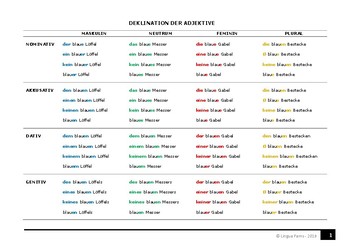

Is it correct? Can you please provide other examples? Also, it says adjective endings AFTER mir, dir, ihm and other personal pronouns. In the weak version, the article das already shows that, so the. we add e or en as specified in this table: Adjektivdeklination 1. We add the following endings after the er: After der, die, das, etc. If a comparative adjective comes before a noun, it must take an ending, just as other adjectives do. Most of these irregular forms are masculine nouns with a genitive - n ending, rather than - s or - es. Reminder: the comparative is formed by adding the ending er to an adjective. But I have read similar explanations on some other websites. That -s on the strong version of that adjective It is the typical neuter nominative -s ending. (Almost all nouns ending in s, ss, ß, sch, z or tz must end with - es in the genitive.) However, there are some nouns with unusual genitive forms. The exceptions are all nominatives in the singular, as well as feminine and neuter accusatives (because they always repeat the articles in their respective genders anyway). For definite and indefinite articles, the same pattern applies. Now, I don't know if this particular website the link of which I have posted, is reputed/trustworthy or not. In short: definite, indefinite and no articles. Third example is having adjective in dative because it is describing "mir"? I don't know, if posting links is permitted here or not. Examples of comparative adjectives and superlative adjectives in German would be: Comparative: Er ist grer als ich (He is taller than me). Comparative and Superlative German Adjectives. we add e or en as specified in this table: Adjektivdeklination 1. Let’s take a look at a couple of examples of comparative and superlative German adjectives, and how the endings change according to the rules of grammar. And today, we’ll start looking at German Adjective Endings Sounds boring.

77 Comments Hello everyone, and welcome to a new episode of the YourDailyGerman grammar. Does the first example have adjective in nominative because it is describing "du". We add the following endings after the er: After der, die, das, etc. The feminine articles end with -er, but the adjective endings still end with -en. In this episode: We'll learn a really nice hack for German Adjective Endings that'll you can use even as a beginner and that'll get you 60 right. #2 Raudona Thanks for replying! I am still having hard time understanding your examples.


 0 kommentar(er)
0 kommentar(er)
